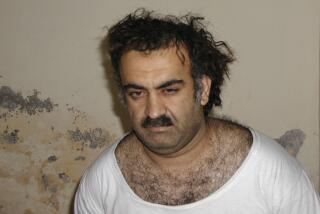Government Considers Trying Moussaoui in a Military Court
WASHINGTON — U.S. officials, concerned that a public trial of accused Sept. 11 conspirator Zacarias Moussaoui might prove embarrassing or hamper anti-terrorism efforts, are weighing the option of dismissing charges and instead trying the Frenchman before a military tribunal.
A senior Defense Department official and sources familiar with the case said Monday that Pentagon and Justice Department officials have been discussing the option of having Moussaoui face a military tribunal instead of standing trial as planned before a jury in federal court in Virginia.
No decision has been made, but talks have been taking place amid concerns over requests made by Moussaoui and his team of stand-by lawyers who are seeking access to evidence and witnesses viewed by the government as sensitive.
One source familiar with the case said the idea of dropping civilian charges had been debated ever since the defense asked for access to some senior Al Qaeda members in U.S. custody.
They include Abu Zubeida and Ramzi Binalshibh. Zubeida and Binalshibh are believed to be the two most senior Al Qaeda members captured since the United States launched a war on the terrorist network it blames for the Sept. 11 attacks.
Binalshibh is named as a co-conspirator in the indictment that charges Moussaoui with six counts of conspiracy -- four of which carry the death penalty -- in the attacks.
Zubeida, one of Osama bin Laden’s top deputies, and Binalshibh are being interrogated outside the United States.
Moussaoui, who was arrested in August 2001 on immigration charges, denied involvement in the airline hijackings but admitted to being a member of Al Qaeda.
Moussaoui’s trial has been delayed twice and is now due to begin in June.
Moussaoui, who is not an attorney but is acting as his own lawyer, and the court-appointed counsel named to assist him have filed sealed requests to the federal court to get access to Binalshibh and Zubeida.
The government, particularly the Defense Department, does not want to permit access and has cited national security concerns in arguing its point.
Moussaoui’s team has argued that he would be denied his constitutional rights if he is not permitted access to witnesses who may be able to prove his innocence.
Lawyers familiar with the case say U.S. District Judge Leonie Brinkema has the option of requiring the government to produce the evidence or the witnesses.
The government could refuse, and possibly drop the charges and bring Moussaoui before a military tribunal, the lawyers said. Alternatively, if the government refuses, Brinkema could dismiss the case and the government could then find a way to make Moussaoui face charges in a military tribunal, the lawyers added.
More to Read
Sign up for Essential California
The most important California stories and recommendations in your inbox every morning.
You may occasionally receive promotional content from the Los Angeles Times.










